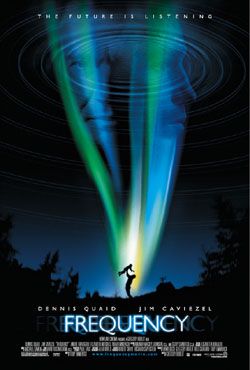"Making Time for Family"

| None | Light | Moderate | Heavy | |
|---|---|---|---|---|
| Language | ||||
| Violence | ||||
| Sex | ||||
| Nudity |
What You Need To Know:
FREQUENCY is an entertaining, pro-family thriller with an interesting take on the age-old science fiction concept of time travel. Its moral worldview suggests not only that family bonds transcend time, but also that every little decision we make can have vast consequences for those who are closest and dearest to us. Another worthy quality in this movie is the concern that both father and son express not just for the life of the mother but also for the lives of the other victims of the serial killer. This is a well-directed, well-written movie marred only by some foul language and some violence. It can lead to some valuable discussions between parents and their teenage children about family and life-and-death issues.
Content:
(BB, LLL, VV, A, D, M) Moral worldview stressing family bonds & human life; 31 obscenities & 15 profanities; moderate violence including fires, explosions, fireman saves woman’s life, man beaten up, gunshots fired, man’s hand shot off, & brief images of skeleton & a woman’s corpse; no sex; no nudity; alcohol use; smoking; and, murderer steals driver’s license to plant incriminating evidence.
More Detail:
FREQUENCY is an entertaining, pro-family thriller with an interesting take on the age-old science fiction concept of time travel. Its moral worldview suggests not only that family bonds transcend time, but also that every little decision we make can have vast consequences for those who are closest and dearest to us.
In the story, Jim Caviezel of THE THIN RED LINE plays a cop named John Sullivan who is able to communicate with his long-dead father, Frank (Dennis Quaid), via an old ham radio. A solar flare apparently has ripped a hole in the space-time fabric. John proves he’s Frank’s grown son by telling Frank what happened in Game One of the 1969 World Series with the “Amazing Mets.” John also gives his father, who’s a fireman, some important advice that saves his life. Regrettably, the advice also puts John’s mother in danger from a mysterious serial killer. Using the ham radio, and John’s knowledge of the serial killer’s case, John and Frank try to stop the killer before he continues his murder spree. Their efforts result in some exciting, mind-bending twists.
Family bonds play an important role in driving the plot of this story. John’s loving memories of his father, and his love for his mother, drive the actions of his character. He also expresses a wonderful concern for the fate of the other women that his meddling with time has cost. For, in John’s time, the serial killer only murdered three women before mysteriously vanishing. John urges his father to follow the leads he provides so that nobody else gets killed, not only John’s mother. Thus, through John and Frank’s heroic efforts, FREQUENCY weaves a moral worldview which honors both family and the dignity of human life.
FREQUENCY uses some interesting visual metaphors to link the two timeframes in which the story takes place, 1969 and 1999. In one, a fireman’s hat spins off Frank’s head in 1969 and a glass falls from John’s hand in 1999. In another, a cigarette burn in a table indicates a significant time change between 1969 and 1999. Providing an emotional link are two solid performances from Dennis Quaid and Jim Caviezel as the father and son.
This is a well-directed, well-written movie marred only by some foul language and some violence. It can lead to some valuable discussions between parents and their teenage children about family and life-and-death issues. The movie also has some references in it to current scientific theories about the nature of time and space. Because of this, concerned parents and teachers will want to consult what Christian philosophers and scientists like J. P. Moreland, Stanley Jaki or Hugh Ross have to say about such theories. It would also be interesting to re-read MERE CHRISTIANITY and MIRACLES by C. S. Lewis in light of this topic.



 - Content:
- Content: 


